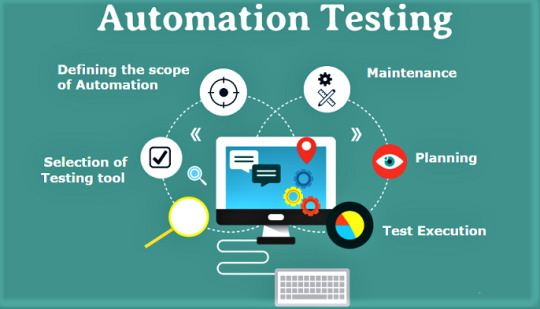#DevOps Testing
Explore tagged Tumblr posts
Text
Automation Testing Insights: Transforming Testing
The global automation testing market size is expected to reach USD 92.45 billion by 2030. Prominent technological advancement in artificial intelligence (AI) and machine learning (ML) is propelling the demand for the market. Mobile application usage is growing across various end-user industries, and smartphone penetration is rising, opening an attractive potential for market expansion. Furthermore, there is a rising demand for automation testing as web-based applications have developed significantly and new software technologies have emerged. The market is growing rapidly due to the increasing usage of ML and AI for advanced analytics and continuous testing across DevOps and DevSecOps areas.

Automation Testing Market Report Highlights
The services segment dominated the market and accounted for over 56% of the global revenue owing to rapid advancements in implementation services, which make it easier to include automation into a functioning infrastructure for software testing
With the aid of this service, automation is integrated into an existing software automation testing setup
The large enterprises segment held the largest revenue share in 2022 as it helps improve efficiency, reduce manual effort, increase test coverage, and ensure the quality of software applications
The BFSI segment is estimated to have significant growth over the forecast period; adopting digitalization in the BFSI sector creates a significant demand for application software automation testing
Gain deeper insights on the market and receive your free copy with TOC now @: Automation Testing Market Report
The emerging use of RPA to automate time-consuming, error-prone manual processes are just a few instances of the usage of AI & ML in automation testing. Moreover, a bot uses the page’s numerous links and web forms to systematically explore through an online application when web crawling or spidering. This is a new use for AI and ML in automation testing. This approach is typically used for indexing online browsing. It may be improved further to perform reverse engineering on an application being tested and automatically find Test Cases. Emerging automation testing tools are significantly fueling market growth.
For instance, Testcraft, a codeless Selenium test automation platform for regression and continuous testing, as well as monitoring of web applications, is gaining traction among users. Their revolutionary AI tech removes maintenance time and cost, as it certainly affects changes in the app. Similarly, Applitools Eyes, Testim, and Test.ai are more automation testing tools propelling the market growth. Furthermore, mergers and acquisitions by other key players are propelling market growth. For instance, in 2022, to improve the user experience on 5G smartphones, Key sight introduced AI-driven and automated testing. Automation and AI enable mobile service providers and app developers to more swiftly evaluate how smartphone users engage with native apps in the real world.
#Automation Testing#Quality Assurance#Software Testing#Test Automation#Continuous Testing#Test Automation Framework#DevOps Testing#Selenium#Test Automation Tools#Performance Testing#Regression Testing#Agile Testing#UIAutomation#Test Scripting#Test Automation Engineer#Codeless Automation#Automation Strategy#CI/CDTesting#Test Automation Best Practices
0 notes
Text
Abathur

At Abathur, we believe technology should empower, not complicate.
Our mission is to provide seamless, scalable, and secure solutions for businesses of all sizes. With a team of experts specializing in various tech domains, we ensure our clients stay ahead in an ever-evolving digital landscape.
Why Choose Us? Expert-Led Innovation – Our team is built on experience and expertise. Security First Approach – Cybersecurity is embedded in all our solutions. Scalable & Future-Proof – We design solutions that grow with you. Client-Centric Focus – Your success is our priority.
#Software Development#Web Development#Mobile App Development#API Integration#Artificial Intelligence#Machine Learning#Predictive Analytics#AI Automation#NLP#Data Analytics#Business Intelligence#Big Data#Cybersecurity#Risk Management#Penetration Testing#Cloud Security#Network Security#Compliance#Networking#IT Support#Cloud Management#AWS#Azure#DevOps#Server Management#Digital Marketing#SEO#Social Media Marketing#Paid Ads#Content Marketing
2 notes
·
View notes
Text
DevOps as Service
2. PROCESS IMPLEMENTATION
We proceed with the analysis, design, building, automation, and implementation in the specified areas.
2 notes
·
View notes
Text
Role of Data Engineering Solutions in Modern Business
AcmeMinds, a leading data engineering company, provides comprehensive data engineering services to help businesses transform raw data into actionable insights. Their tailored data engineering solutions include building scalable data pipelines, data cleaning and transformation, real-time analytics, and support for AI and machine learning. AcmeMinds empowers businesses to optimize decision-making, enhance operational efficiency, and drive sustainable growth.
2 notes
·
View notes
Text
SPARK TECHNOLOGIES
We deliver value by identifying opportunities that align with business objectives and adopting an agile approach to implement them.
#Web developement#Software testing#Devops & Engineering#Salesforce#Mobile Application Developmen#Data Analytics#IT Consulting#IT Outsourcing#Web Design#Content Management System#Digital Marketing
2 notes
·
View notes
Text



Levitica Technologies Pvt Ltd, established in 2013, specializes in web development and testing. We have branches in Hyderabad and Rajahmundry; the Hyderabad office focuses on project execution, while the Rajahmundry branch is dedicated to training and placement services.
#software companies in rajahmundry#Software Development Companies in Rajahmundry#Software Companies in Andhra Pradesh#Software Trainings in Rajahmundry#Software Course Training in Rajahmundry#Software Testing Courses in Rajahmundry#Full Stack Development in Rajahmundry#Digital Marketing Course in Rajahmundry#AWS Course in Rajahmundry#Devops Course in Rajahmundry#Linux Course in Rajahmundry#Best Software Training Institute in Rajahmundry#Best Placement Provider in Rajahmundry
2 notes
·
View notes
Text
The Internet of Things (IoT) is rapidly transforming our world, weaving a complex tapestry of interconnected devices that collect, share, and analyze data.
0 notes
Text
#devops#automation testing company#automation testing services#software testing services#software testing company
1 note
·
View note
Text
Navigating the Nervous Waters of Coding
Daily writing promptWhat makes you nervous?View all responses AI-generated image. “This code is going well…a little too well.” The Code Creep: Why Every Line Can Feel Like a Tightrope Walk What makes me nervous? You might think it’s a looming deadline or a particularly gnarly algorithm. And while those definitely get the heart racing, the real source of my coding jitters? It’s the act of…
#Artificial Intelligence#best practices#c#c++#career advice#Cloud computing#coding#dailyprompt#dailyprompt-1916#data science#debugging#devops#java#javascript#machine learning#mobile development#Programming#python#software development#testing#tutorials#web development
1 note
·
View note
Text
Say goodbye to fragile deployments and late-night outages. SDH's #DevOps expertise ensures you have reliable, repeatable workflows that scale.
0 notes
Text
Enterprise Application Development Services
AcmeMinds offers comprehensive Enterprise Application Development Services tailored to meet the unique needs of large organizations. Our solutions enhance operational efficiency, streamline workflows, and integrate seamlessly with existing systems. With a focus on scalability and security, AcmeMinds empowers businesses to thrive in a competitive landscape through innovative technology solutions. Read more ...
2 notes
·
View notes
Text
Netflix's Chaos Monkey: Embracing Failure for Resilience
Chaos Monkey is an innovative tool developed by Netflix as part of their Simian Army suite of testing tools. It deliberately introduces failures into your cloud infrastructure to test system resilience and recovery capabilities. Chaos Monkey works by randomly terminating instances in your production environment. This might sound counterintuitive, but by forcing failures to occur, it helps…
#AWS#chaos engineering#chaos monkey#cloud infrastructure#cloud resilience#devops#disaster recovery#failure injection#fault tolerance#high availability#implementation tutorial#infrastructure automation#infrastructure testing#microservices testing#netflix chaos monkey#netflix open source#netflix technology#production testing#resilience testing#simian army#site reliability engineering#system architecture#system reliability#system resilience
0 notes
Text
The Role of Hybrid Mobile App Development and Software Testing

Introduction
With the rapid evolution of mobile applications, businesses worldwide are looking for cost-effective and high-quality solutions. Hiring React Native developers in India has become a popular choice due to India's vast talent pool and affordability. Additionally, partnering with a hybrid mobile application development company in India ensures businesses get scalable and efficient mobile applications. However, developing an app is just one part of the process—ensuring its quality requires a reliable software testing company in India.
In this article, we will explore why hiring React Native developers in India is beneficial, how hybrid mobile development is transforming businesses, and why software testing is crucial for delivering high-performance applications.
Why Hiring React Native Developers in India is a Smart Choice?
React Native is one of the most widely used frameworks for mobile app development. It allows developers to build cross-platform applications using a single codebase, significantly reducing development time and costs. Here’s why businesses prefer to hire React Native developers in India:
1. Cost-Effective Development
India is known for offering world-class software development services at a fraction of the cost compared to Western countries. Companies can save up to 60% on development costs by outsourcing their projects to Indian developers.
2. Access to Skilled Developers
India has a massive pool of skilled developers who specialize in React Native. They are well-versed in modern development practices, ensuring high-quality and efficient applications.
3. Faster Development Time
Hiring experienced React Native developers in India means businesses can significantly reduce their development timelines. Since React Native allows for code reusability, applications can be built faster without compromising quality.
4. Seamless Integration with Third-Party Services
React Native developers in India are proficient in integrating third-party services such as payment gateways, analytics tools, and cloud services, enhancing the functionality of mobile applications.
5. Strong Community Support
React Native has an extensive developer community in India. This ensures that businesses hiring Indian developers always have access to the latest updates, plugins, and best practices.
The Role of a Hybrid Mobile Application Development Company in India
Many businesses prefer hybrid mobile app development as it offers flexibility, cost savings, and faster deployment across multiple platforms. Hybrid apps are built using frameworks like React Native, Flutter, and Ionic, ensuring a smooth user experience across Android and iOS.
1. Cost-Effective App Development
A hybrid mobile application development company in India can deliver feature-rich apps at a lower cost compared to native app development. Since hybrid apps use a single codebase, businesses save time and money on development and maintenance.
2. Faster Time-to-Market
Speed is crucial in today’s competitive digital world. With hybrid development, businesses can launch their apps faster as developers do not need to write separate codes for Android and iOS.
3. Scalability and Flexibility
Hybrid apps are designed to be scalable, meaning businesses can expand their applications with minimal effort. Whether adding new features or integrating advanced functionalities, hybrid apps offer flexibility.
4. Seamless Performance Across Devices
A top hybrid mobile application development company in India ensures that apps work smoothly across different devices and screen sizes, providing a consistent user experience.
5. Easy Maintenance and Updates
Unlike native apps, hybrid apps allow developers to make changes quickly and push updates without requiring users to download new versions manually.
Why is Software Testing Essential?
Developing a mobile application is just the first step. To ensure an app performs well and is free from bugs, businesses must partner with a software testing company in India.
1. Enhancing App Quality
Software testing ensures that mobile applications meet quality standards before they reach the users. Testing helps identify and fix bugs that may otherwise lead to poor user experiences.
2. Reducing Costs in the Long Run
Identifying and fixing issues during the development stage prevents costly fixes after launch. A software testing company in India can help businesses save money by conducting thorough testing before deployment.
3. Security and Data Protection
With cyber threats on the rise, security testing ensures that apps protect user data from vulnerabilities. Indian testing companies follow international security standards to safeguard applications.
4. Performance Optimization
A slow or buggy app can lead to user frustration and loss of customers. Performance testing helps optimize app speed and functionality, ensuring a seamless experience for users.
5. Compatibility Across Devices and Platforms
Apps need to function properly across different devices and operating systems. Software testing companies in India conduct compatibility testing to ensure that applications work flawlessly on various platforms.
Conclusion
Hiring React Native developers in India, choosing a hybrid mobile application development company in India, and working with a software testing company in India can significantly enhance business growth. React Native offers a cost-effective and efficient way to develop mobile apps, while hybrid app development ensures scalability and flexibility. Lastly, thorough software testing guarantees high-quality, secure, and performance-optimized applications.
For businesses looking to build robust mobile applications, BuzzyBrains offers expert React Native developers, hybrid app development services, and comprehensive software testing solutions. Partnering with a trusted technology provider like BuzzyBrains ensures your app is future-proof and delivers an exceptional user experience.
For more details on hiring developers or building mobile apps, visit BuzzyBrains today!
#buzzybrains software#software testing company in india#devops companies in india#hybrid mobile application development company in india#hire react native developers india#hire react native developers in india
0 notes
Text
The MERN stack (MongoDB, Express.js, React.js, Node.js) is a popular full-stack JavaScript framework for building modern web applications. This stack allows developers to use a single language (JavaScript) across both client-side and server-side code. If you're a MERN stack developer, mastering key tasks within each of these technologies is crucial for creating robust and scalable web applications.
In this guide, we'll walk through the 10 most important tasks every MERN stack developer should master, helping you build a strong foundation for web development.
#MERNStack#MongoDB#ExpressJS#React#NodeJS#FullStackDevelopment#WebDevelopment#FrontendDevelopment#BackendDevelopment#JavaScript#API#RESTAPI#CRUDOperations#ReactJS#StateManagement#MongoDBQueries#Authentication#Authorization#JWT#Git#GitHub#DevTools#DevOps#Testing#PerformanceOptimization#Security#VersionControl#Deployment#CI/CD#Docker
0 notes
Text
We at DevLabs are more than just another IT company. We are the catalyst that boosts your business. With a vision to make a change in the existing IT standards, DevLabs Alliance has been dedicated to excelling in the IT domain for the last five years.Headquartered in India, DevLabs Alliance has been able to expand its services worldwide in countries like America.But what we are today was not built overnight. It took a whole cycle of continuous development, learning from mistakes, and slowly bringing a revolution in the IT landscape.
#testing#devops#certifications#softwaredevelopment#technology#web development#automation#dla#devops engineer
0 notes